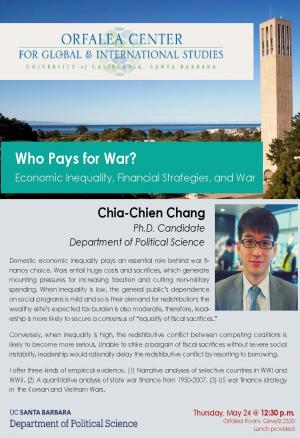Event Date:
Event Date Details:
Lunch provided
Event Location:
- Orfalea Room - Girvetz 2320
Chia-Chien Chang's research engages questions at the intersection of international political economy and security, with a specific focus on the interactions of finance, crises and war. His dissertation utilizes both quantitative and qualitative methods to show how domestic economic inequality and states’ war finance strategies affect their engagement in war as well as the outcome of intra-war bargaining.
In this talk, Chia-Chien Chang discusses domestic economic inequality and how it plays an essential role behind war finance choice. Wars entail huge costs and sacrifices, which generate mounting pressures for increasing taxation and cutting non-military spending. When inequality is low, the general public’s dependence on social programs is mild and so is their demand for redistribution; the wealthy elite’s expected tax burden is also moderate, therefore, leadership is more likely to secure a consensus of “equality of fiscal sacrifices.”
Conversely, when inequality is high, the redistributive conflict between competing coalitions is likely to become more serious. Unable to strike a bargain of fiscal sacrifices without severe social instability, leadership would rationally delay the redistributive conflict by resorting to borrowing.
He will offer three kinds of empirical evidence. (1) Narrative analyses of selective countries in WWI and WWII. (2) A quantitative analysis of state war finance from 1950-2007. (3) US war finance strategy in the Korean and Vietnam Wars.






